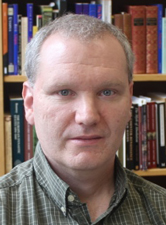 Associate Professor Daniel Riches was a recipient of the College Academy of Research, Scholarship, and Creative Activity (CARSCA) Grant. The CARSCA grant helped fund his research in European collections, including the National Archives of Great Britain, British Library, France’s Archives Nationales and Bibliothèque Nationale, and Germany’s Geheimes Staatsarchiv and Staatsbibliothek zu Berlin, for his current book project, Pan-Protestantism After Westphalia, during his Spring 2015 sabbatical. Dr. Riches will present a portion of the results of his funded research at the 2016 CARSCA Conference on April 27 in the Ferguson Center Forum, at 1:15 pm.
Associate Professor Daniel Riches was a recipient of the College Academy of Research, Scholarship, and Creative Activity (CARSCA) Grant. The CARSCA grant helped fund his research in European collections, including the National Archives of Great Britain, British Library, France’s Archives Nationales and Bibliothèque Nationale, and Germany’s Geheimes Staatsarchiv and Staatsbibliothek zu Berlin, for his current book project, Pan-Protestantism After Westphalia, during his Spring 2015 sabbatical. Dr. Riches will present a portion of the results of his funded research at the 2016 CARSCA Conference on April 27 in the Ferguson Center Forum, at 1:15 pm.
Pan-Protestantism After Westphalia examines the continuing vitality and political influence of transnational pan-Protestant networks in Europe well after the supposed Westphalian cleft was drawn between the confessional and post-confessional ages. The importance, and even existence, of such groups in the post-1648 world has flown under the radar of traditional political and diplomatic history, perhaps since the networks and their activities go against the assumed trajectories of the nascent, modern state system: the Pan-Protestants were religiously-motivated rather than increasingly secular; their organization was de-centralized and non-institutional rather than being subject to the rationalizing and centralizing energies of the developing states; their activities were at least semi-autonomous of the supposedly growing monopoly of power wielded by these states; and their outlook was deliberately international as opposed to ever-more attendant to political and national boundaries. Furthermore, members of Pan-Protestant networks proved adept at harnessing the creative energies of the developing states and redirecting expanded state

capabilities in service of their own religious and political agendas, complicating any assumptions that state structures would evidently function in the service of state (rather than other) interests. Accounting for the influence that these networks were able to exert on international affairs, therefore, requires a more nuanced understanding of the supposed secularization of international relations, and of the role of religious issues in the birth of the modern state.